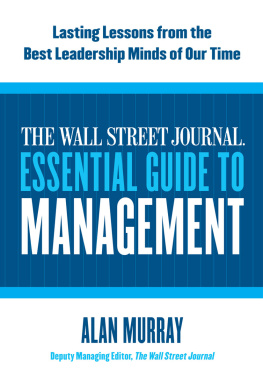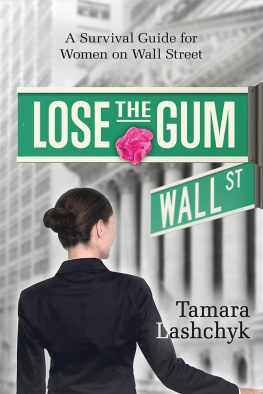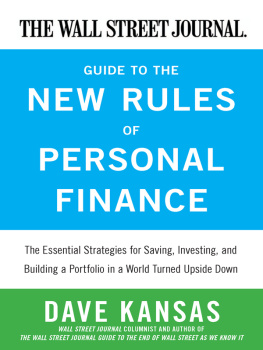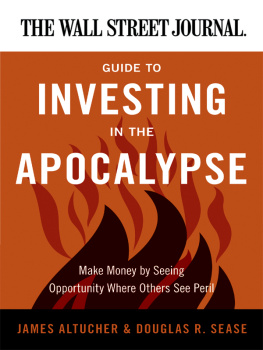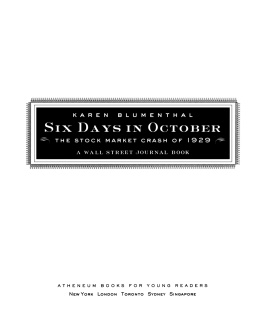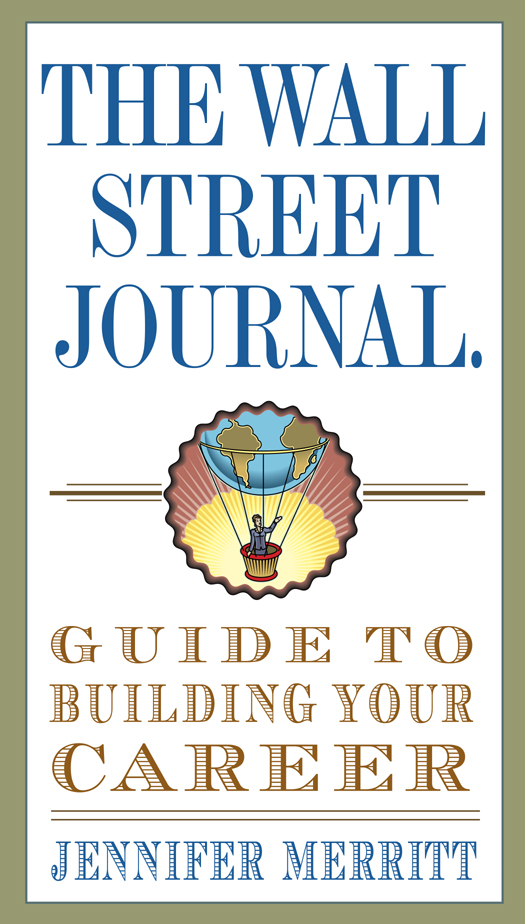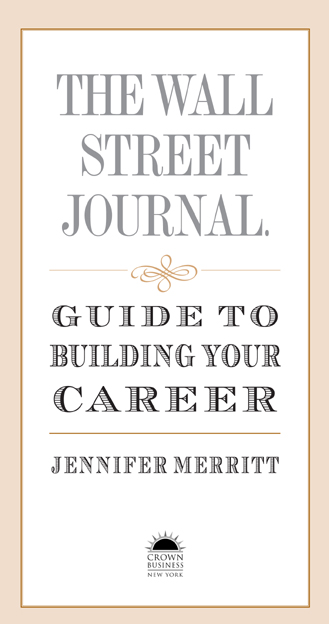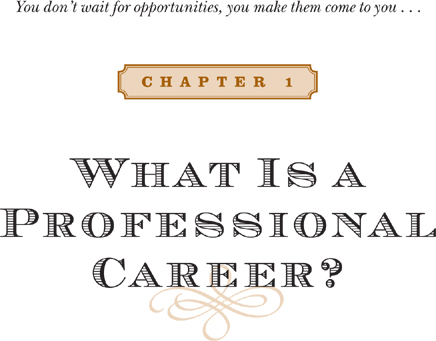OTHER BOOKS FROM
THE WALL STREET JOURNAL
The Wall Street Journal Guide to the Business of Life
Nancy Keates
The Wall Street Journal Complete Money & Investing Guidebook
Dave Kansas
The Wall Street Journal Complete Personal Finance Guidebook
Jeff Opdyke
The Wall Street Journal Complete Personal Finance Workbook
Jeff Opdyke
The Wall Street Journal Complete Real-Estate Investing Guidebook
David Crook
The Wall Street Journal Complete Identity Theft Guidebook
Terri Cullen
The Wall Street Journal Complete Retirement Guidebook
Glenn Ruffenach and Kelly Greene
The Wall Street Journal Complete Home Owners Guidebook
David Crook
The Wall Street Journal Guide to Starting Your Financial Life
Karen Blumenthal
The Wall Street Journal Financial Guidebook for New Parents
Stacey L. Bradford
Copyright 2012 by Dow Jones & Company, Inc.
The Wall Street Journal is a registered trademark of Dow Jones and is used by permission.
All rights reserved.
Published in the United States by Crown Business, an imprint of the Crown Publishing Group, a division of Random House, Inc., New York.
www.crownpublishing.com
CROWN BUSINESS is a trademark and CROWN and the Rising Sun colophon are registered trademarks of Random House, Inc.
Cataloging-in-Publication Data is on file with the Library of Congress.
eISBN: 978-0-307-71957-7
Cover illustration: Peter Hoey/theispot.com
v3.1
CHAPTER 1
W HAT I S A P ROFESSIONAL C AREER?
CHAPTER 2
T HE I NTERNSHIP I S THE N EW F IRST J OB
CHAPTER 3
L ANDING Y OUR F IRST J OB
CHAPTER 4
Y OUR F IRST Y EAR AT W ORK
CHAPTER 5
G ETTING TO THEN EXT R UNG OF THE L ADDER
CHAPTER 6
C AREER B OOSTERS: S ETTING Y OURSELF A PART
CHAPTER 7
Y OUR N EXT J OB
T his isnt just another book about how to get a job. Even in a tough economy, pretty much anyone can get some sort of job or another. No, this is a book about building a career. So, what is the difference between a job and a career? Simply put, a career is a lifelong endeavor, the pursuit of a professional track that consists of multiple jobs youll stack one on top of the other (experts call it a career ladder for a reason), each tapping into skills and experiences youve already had and each adding a new set of skills, increased responsibilities and challenges, and fresh experiences.
For someone focused on a professional career track, each job you choose matters, so its critical to consider not just what you can do in the next job, but also the tangible skills and experiences you can take away from each position and use for selling yourself in the future, says career coach J.T. ODonnell of Careerealism.com. Figuring out what those skills are before you take a job is an art, of sorts, one that takes a few hits and even some misses to refine. But building a professional career is about landing the next job on the ladderand you can do that only if youve built new skills each step of the way.
For the purposes of this guide, consider a professional career as one where you start in that ubiquitous entry-level position and climb the ladder toward a management or leadership position. How you get to that leadership role can varyfrom a straight-line ladder leading up, to a zigzag climb that will find you moving among different functions or departments, sometimes moving laterally, then up, sometimes moving up a few rungs at a time. For many people, the path will be a bit of both.
Along the way, each job you choose should build the skills and experiences you need in order to reach your short-term and longer-term goalsstarting as early as a strong internship in college (better yet, two) to help you land that first job after college.
I know it sounds daunting, but it doesnt have to be. This book will guide you through the steps you need to take, from deciding on a career path, to scoring that first internship, to making the most of it to pave the way to your first real job (dont worry, if youve already missed the internship boat, you can still get where you want to go with a little extra maneuvering youll learn about in the following chapters). Then well look at how to land that first job, negotiate your first salary (which is crucial, as its the starting place for all future salaries), and earn that critical early promotion that will put you on the path you desire. Then youll learn some tricks for how to move up that ladder faster, including networking, smart early job moves that will set the foundation for your future success, career boosters that can set you apart from the crowd, and more.
WHERE TO START:
DECIDING WHAT CAREER IS RIGHT FOR YOU
Many ambitious college students walk into their first class with a good idea about what theyd like to do when they grow up, or at least a sense of the field theyd like to work in once they graduate. But thats just a start. Many industries and professions have become so diversified and segmented that simply saying you want to work in such-and-such field doesnt paint a full picture of what you really want to do.
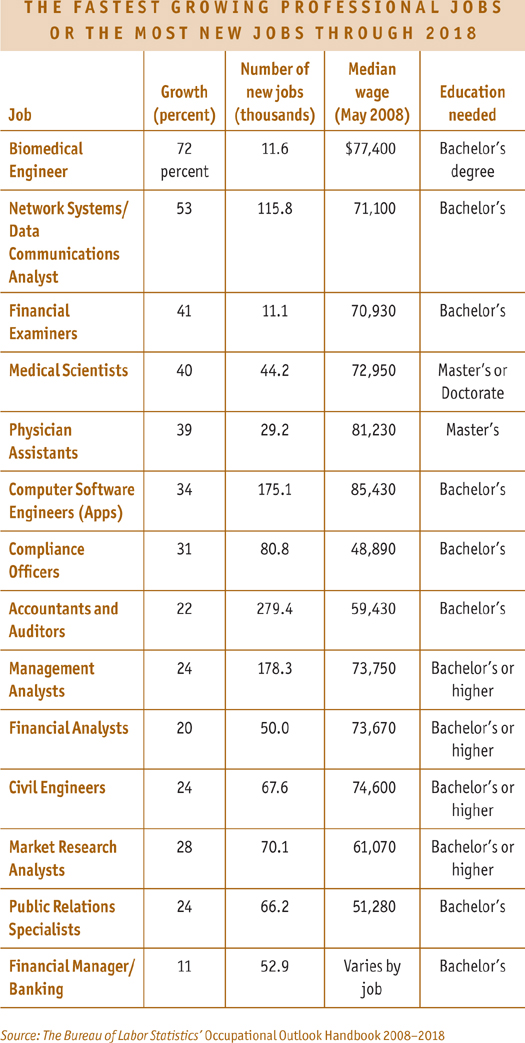
Lets take engineering, for example. There are some two dozen specialties in engineering, from the more common civil, mechanical, chemical, and electrical, to the more specialized subsets such as aerospace, geotechnical, biomedical, environmental, petroleum, and nuclear. But even careers with fewer head-spinning options still present forks in the road. Take marketing: market research, promotions, account management, and even public relations and advertising can fall under the marketing moniker at many companies. The point is that before you decide which first job or internship to go after, you need to narrow down (as best you can) what exactly you ultimately want to do.
Of course, thats easier said than done. With all the different options out there, how are you supposed to figure out what field or industry most interests you? Well, it isnt easy, but the good news is, theres no wrong answer (although choosing a professional track thats not likely to be around in a decade might not be so wise). The key is to figure out the intersection between your interests and your aptitude. It helps to first rule out areas where what fascinates you does not match your abilities. For example, you might find biomedical engineering fascinating but struggle in biology classes. Or you might be drawn to market research but lack an aptitude for the database mining and analysis it actually requires. While there may be a sign that a particular job isnt right for you, a fascination with marketing might yield a more creative career in the field, or struggling in biology but not other earth sciences could make environmental engineering right for you.



